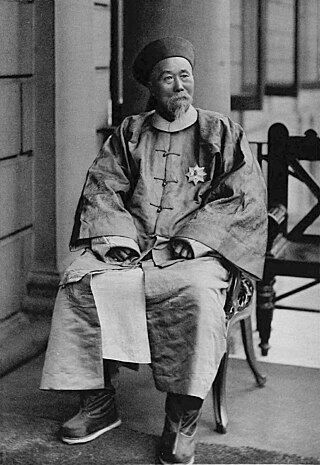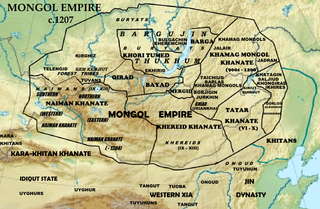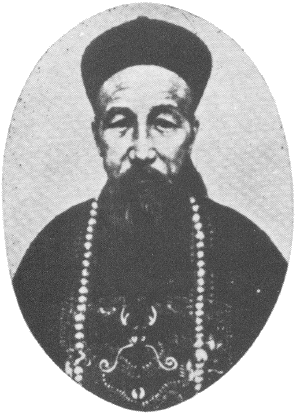Related Research Articles

Li Hongzhang, Marquess Suyi was a Chinese politician, general and diplomat of the late Qing dynasty. He quelled several major rebellions and served in important positions in the Qing imperial court, including the Viceroy of Zhili, Huguang and Liangguang.

Hong Taiji, also rendered as Huang Taiji and sometimes referred to as Abahai in Western literature, also known by his temple name as the Emperor Taizong of Qing, was the second khan of the Later Jin dynasty and the founding emperor of the Qing dynasty. He was responsible for consolidating the empire that his father Nurhaci had founded and laid the groundwork for the conquest of the Ming dynasty, although he died before this was accomplished. He was also responsible for changing the name of the Jurchen ethnicity to "Manchu" in 1635, and changing the name of his dynasty from "Great Jin" to "Great Qing" in 1636. The Qing dynasty lasted until 1912.
Giuseppe Castiglione, S.J., was an Italian Jesuit brother and missionary in China, where he served as an artist at the imperial court of three Qing emperors – the Kangxi, Yongzheng and Qianlong emperors. He painted in a style that is a fusion of European and Chinese traditions.
The Self-Strengthening Movement, also known as the Westernization or Western Affairs Movement, was a period of radical institutional reforms initiated in China during the late Qing dynasty following the military disasters of the Opium Wars.
The Jianzhou Jurchens were one of the three major groups of Jurchens as identified by the Ming dynasty. Although the geographic location of the Jianzhou Jurchens changed throughout history, during the 14th century they were located south of the Wild Jurchens and the Haixi Jurchens, and inhabited modern-day Liaoning and Jilin provinces in China. The Jianzhou Jurchens were known to possess an abundant supply of natural resources. They also possessed industrial secrets, particularly in processing ginseng and the dyeing of cloth. They were powerful due to their proximity to Ming trading towns such as Fushun, Kaiyuan, and Tieling in Liaodong, and to Manpojin camp near Korea.

Keying, also known by his romanized Mandarin Chinese name Qiying or Ch'i-ying (Wade–Giles) and his Manchu name Kiyeng, was a Manchu statesman during the Qing dynasty of China. An imperial clansman of the house of Aisin Gioro, he began his career in the Imperial Clan Court. He conducted several peace treaties with Western powers, beginning with the Treaty of Nanking, which ended the First Opium War with Britain in 1842. Keying was sent to negotiate again in 1858 to settle the Arrow War with Britain and France, but the settlement was repudiated by the Xianfeng Emperor and he was forced to commit suicide.

Xu Guangqi or Hsü Kuang-ch'i, also known by his baptismal name Paul, was a Chinese agronomist, astronomer, mathematician, politician, and writer during the Ming dynasty. Xu was appointed by the Chinese Emperor in 1629 to be the leader of the ShiXian calendar reform, which he embarked on with the assistance of Jesuits. Xu was a colleague and collaborator of the Italian Jesuits Matteo Ricci and Sabatino de Ursis and assisted their translation of several classic Western texts into Chinese, including part of Euclid's Elements. He was also the author of the Nong Zheng Quan Shu, a treatise on agriculture. He was one of the "Three Pillars of Chinese Catholicism"; the Roman Catholic Church considers him a Servant of God. On April 15, 2011, Vatican spokesman Federico Lombardi announced the beatification of Xu Guangqi.

Uriankhai, Uriankhan or Uriankhat, is a term of address applied by the Mongols to a group of forest peoples of the North, who include the Turkic-speaking Tuvans and Yakuts, while sometimes it is also applied to the Mongolian-speaking Altai Uriankhai. The Uriankhai included the western forest Uriankhai tribe and the transbaikal Uriankhai tribe, with the former recorded in Chinese sources as 兀良哈.

The Xiang Army or Hunan Army was a standing army organized by Zeng Guofan from existing regional and village militia forces called tuanlian to contain the Taiping Rebellion in Qing China. The name is taken from the Hunan region where the Army was raised. The Army was financed through local nobles and gentry, as opposed to through the centralized Manchu-led Qing dynasty. The army was mostly disbanded by Zeng after the re-capture of the Taiping capital at Nanking.
The Huai Army, named for the Huai River, was a military force allied with the Qing dynasty raised to contain the Taiping Rebellion in 1862. It was also called the Anhui Army because it was based in Anhui province. It helped to restore the stability of the Qing dynasty. Unlike the traditional Green Standard Army or Eight Banners forces of the Qing, the Huai Army was largely a militia army, based on personal rather than institutional loyalties. It was armed with a mixture of traditional and modern weapons. Li Hongzhang, a commander in the Xiang Army, created the Huai Army in October 1861. It succeeded Zeng Guofan’s Xiang Army. The Huai Army itself was succeeded by the New Army and the Beiyang Army, which were created in the late 19th century.
Mao Wenlong, courtesy name Zhennan, was a Chinese military general of the Ming dynasty. He is best known for commanding Ming forces in the naval battles against forces of the Manchu-led Qing dynasty in the Yellow Sea during the Qing conquest of the Ming. He was also known for excelling in artillery warfare and for successfully incorporating Western-style tactics into the Chinese military.
Chuang Chi-fa is a Taiwanese historian who studies Chinese history, in particular Manchu history. Chuang is one of the few linguistics researchers with a mastery of the Manchu language.
The Chu Army was a standing regional army organized by Zuo Zongtang (左宗棠). The name is taken from the Hunan region where the Army was raised. The Army was financed through local nobles and gentry, as opposed to the central government.
The Imperial Clan Court or Court of the Imperial Clan was an institution responsible for all matters pertaining to the imperial family under the Ming and Qing dynasties of imperial China. This institution also existed under the Nguyễn dynasty of Vietnam where it managed matters pertaining to the Nguyễn Phúc clan.
Chen Mingxia was Grand Secretariat and President of Ministry Personnel of the Qing dynasty. He was from Liyang in Jiangsu and was a Chinese official during the Shunzhi period (1644–1661) of the Qing dynasty (1644–1912). Before joining the Qing in early 1645, he had successively served the Ming dynasty (1368–1644) and the short-lived Shun regime of rebel leader Li Zicheng (1602–1645). He then served in the highest ranks of the Qing bureaucracy, being promoted to Grand Secretariat of the empire.
Events from the year 1667 in China.
Events from the year 1688 in China.

Chen Tingjing was a Han Chinese politician and scholar who served as tutor to the Kangxi Emperor and was chief editor of the Kangxi Dictionary.
References
- ↑ Hummel, Arthur W. Sr., ed. (1943). . Eminent Chinese of the Ch'ing Period . United States Government Printing Office. p. 327.
- ↑ Peterson, Willard J. (16 December 2002). The Cambridge History of China: Volume 9, Part 1, The Ch'ing Empire to 1800. Cambridge University Press. pp. 135–. ISBN 978-0-521-24334-6 . Retrieved 10 June 2012.
- ↑ Giles, Herbert Allen (1898). A Chinese Biographical Dictionary (Public domain ed.). Chʻeng-Wen Publishing Company. p. 698. Retrieved 10 June 2012.